John "Jack" M. Flynn, MD
Dr. John “Jack” Flynn is the Chief of Orthopaedic Surgery at The Children’s Hospital of Philadelphia and Professor of Orthopaedic Surgery at the University of Pennsylvania. His clinical focus includes spine deformity, early onset scoliosis/thoracic insufficiency, fractures, and hip disorders. He is the author of over 400 peer-reviewed papers, reviews, and chapters, and an editor of the seminal texts in pediatric orthopaedics: Lovell and Winter’s Pediatric Orthopaedics, Rockwood’s Fractures in Children, Operative Techniques in Pediatric Orthopaedics, and Staying Out of Trouble in Pediatric Orthopaedics. A winner of multiple teaching awards, Jack lectures nationally and internationally on the management of spinal disorders, pediatric fracture care, safety and value in surgical care, and life-work integration for physicians. Jack was inducted into the UPenn School of Medicine Academy of Master Clinicians in 2022.
Jack grew up in Newark, DE, as the eldest of six children. His father, a football and track coach at the University of Delaware, instilled in Jack the mantra “Son, make yourself useful!” While his father may have been primarily interested in his services doing chores and babysitting, those who are close with Jack have seen how much this applies to all aspects of his life. He has become a “down-to-earth” example of proficiency and empathy that goes far beyond simple utility.
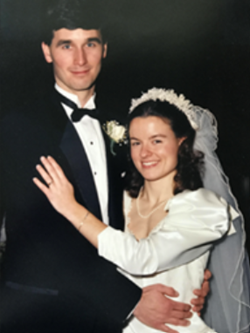
Jack’s first life-transforming event occurred in seventh grade when he received a scholarship to go to Tower Hill School in Wilmington. As he explains, “That’s where I learned the smell of excellence.” He chose Johns Hopkins for college so he could play both baseball and football. At Hopkins, he had his second life-transforming event: the first week of college, he met his wife, Mary.
(Right Image: Jack and Mary’s Wedding Day, 1988)
Jack and Mary have been married for over 36 years and are the embarrassingly proud parents of Erin, Colleen, John, and Kelly, and granddaughter Emma (born during the 2022 POSNA Annual Meeting in Vancouver, BC). He describes Mary as the “brains of the operation.” Jack went to Pitt for medical school primarily so Mary could get her master’s degree in applied mathematics at Carnegie Mellon. At Pitt, Jack met Ed Hanley who offered him research in his lab and mentored him on the path to orthopaedic residency. Next was Boston for Jack’s ortho residency at Harvard and Mary’s career in operations analysis. Their family blossomed with the first two babies … and he fell in love with pediatric orthopaedics the first time he rotated through Boston Children’s as a second-year resident. He was the Boston Children’s Chief Resident in 1995, which is a 6-month mini-fellowship in pediatric orthopaedics. He then did a traditional year of pediatric ortho fellowship at DuPont Nemours.
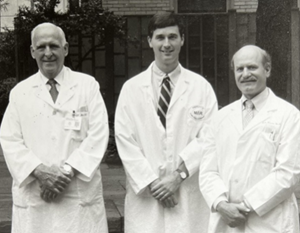 (Left Image: Jack as Chief Resident at Boston Children’s, 1995)
(Left Image: Jack as Chief Resident at Boston Children’s, 1995)
When he first interviewed at CHOP, they were clearly in dire need of another pediatric orthopaedic surgeon. He recalls, “I went down to John Dorman’s clinic—they had like 30 families standing outside the clinic desk waiting to be seen. They were so desperate for help on-call, they had no one who knew how to do PAOs, they needed to get somebody to run their CP clinic, and they needed somebody else to do sports.” Jack said he thought, I’m going to be much more useful at CHOP [than other options] … this really resonates with my goals in life. “Thus, I am super boring: I have only had one job, one wife, one secretary, and one house.” This consistency has allowed him to focus on his family life, which is enormously important to him. One of Jack’s greatest professional life experiences was doing the 3-week 2002 POSNA Travelling Fellowship in Europe with Ken Noonan and David Skaggs.
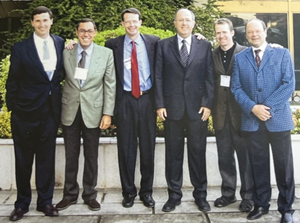 (POSNA Travelling Fellows - Europe, 2002)
(POSNA Travelling Fellows - Europe, 2002)
Jack started at CHOP in 1996 and began his ascent in leadership roles when in 2006, he was appointed Associate Chief of CHOP orthopaedics by John Dormans. Then, in 2014, he was told to take over as Chief. He has “never run for office”—he has been asked/told to take all his leadership roles over the years. This included the nomination to be on the POSNA presidential line (President 2013-2014), his service as an ABOS Director for the past 10 years, president of the Pediatric Spine Foundation, and member of the JBJS Board of Trustees.
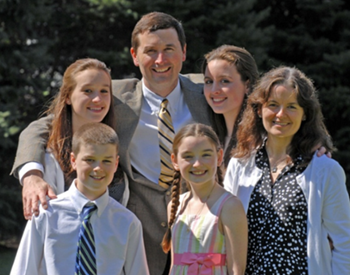 (Right Image: The Flynn family, 2006)
(Right Image: The Flynn family, 2006)
Despite not actively pursuing leadership roles, he has enjoyed tackling problems and making himself useful to those he served. He says, “I figure just let God’s Universe unfold as it should, and I just go with it.” In 2018, CHOP decided to open a new hospital in King of Prussia, 20 miles to the west, where he was asked to lead all surgical services. At the time, he felt he did not know anything about building hospitals and leading surgical services, but it turned out to be a fantastic experience expanding his understanding of operations management, financial stewardship, and quality/safety. As a serious lifelong learner, I suspect the energy he had to create a hospital may have been found in the tons and tons of what people call self-help books, that fill his home library. “I feel like to be my best and be useful, I need to constantly keep learning. When I became chief 10 years ago, I needed to learn more about finances and many other things. I didn’t have time to go get an MBA, so I read all those books.”
After all the achievements in the past, Jack is now primarily focused on elevating others—to help the next generation take off. “I think of this career moment using that mountaineer analogy: going through surgical training, then ramping up a huge surgical practice while raising four kids and serving so many organizations … that’s like rock climbing (in the driving sleet and rain). Finally, there comes a time when you get up to the top of the mountain, and you look around and you say: this must be the reward phase of life! So, now I’m standing at the top of the mountain and enjoying the view. If there are more mountains to climb, I can still go to another peak … but I am so happy now, I actually feel guilty!
“We all go through some really tough moments in life. My dad died during the pandemic of a heart problem. We were giving him hospice care in our house in December 2020. Literally, he was holding my hand when he closed his eyes and died. We all go through those things. But when I look at the big picture—my family and how much I get to do for others—it’s like ‘Oh my God, I feel guilty! I got to keep this a secret! It’s not fair!’”
Some of the recent accomplishments that he reflects upon include a decade as ABOS Director, where he implemented the Web-based Learning Assessment pathway for recertification. After recertifying in 2016 with the general orthopaedics exam, he was struck by how few questions related to his actual practice. This led to his elevation of subspecialty exams and launching the WLA. He also invented the Virtual Practice Evaluation (which became useful for oral exams during the pandemic in 2020). His vision for the future is to have a streamlined process where every surgeon recertifies every 10 years based on their unique practice profile. He believes this will reduce age discrimination and improve safety. As he completes his service as an ABOS Director in 2024, he’ll continue to serve on the Board of Trustees of the Journal of Bone and Joint Surgery, the Pediatric Spine Foundation, Children’s Surgical Associate’s (CHOP’s surgery practice plan), and Tower Hill School (his first launching pad).
Among his academic contributions, he wrote many highly cited pediatric trauma studies. He launched Dedicated Spine Teams at CHOP, and published evidence that the spine teams and the Rapid Recovery Pathway (he launched with Woody Sankar) dramatically improved quality, safety, and value in scoliosis care. Jack was the first pediatric spine surgeon in the country to use image-guided navigation for scoliosis in 2007. His many contributions to POSNA included being Chair of IPOS® for 5 years and founding Chair of the Quality Safety Value Initiative.
Beyond service to professional societies, Jack feels that perhaps his favorite project has been to transform CHOP Orthopaedics into the most fun place to work. In November of 2014, when Jack was returning from New Zealand after doing a visiting professor gig with Haemish Crawford, the book he was reading on the flight home was Daniel Pink’s Drive, which focused on how modern humans thrive when their work environment is focused on “Autonomy, Mastery, and Purpose.” The day he arrived home, CHOP’s Chair of the Department of Surgery called Jack in and told him he had to immediately take over as Chief of Orthopaedics. From that day in 2014, implementing the Autonomy/Mastery/Purpose culture was among his most important strategic priorities, and it’s been wildly successful in recruiting and retaining talent and building a culture where everyone has a blast caring for the children. “I always ask visitors: please don’t tell anybody how much fun we are having—they may become angry—because these days, you know, work is supposed to be miserable.”
“Every 2 years all doctors at CHOP must take the Stanford Wellbeing Survey. We just got our results a few weeks ago: CHOP Orthopaedics has the highest score in the entire institution for autonomy—owning your practice and making your own choices. We are tied for 2nd in the entire hospital for lowest burnout scores, despite the fact we must cover trauma calls at two different hospitals, practice at eight clinics in two states, and progress through the incredible academic promotion pressure at Penn. Our faculty feel like they run their life, they’re happy to have the autonomy to make their own life choices. Our “Mastery” efforts include huge clinical research investment so all can thrive academically, as well as surgical coaching and leadership courses. In terms of Purpose, it should be easy at a children’s hospital, but the grind of EMR, etc., can distract us. One of our tricks is the Wall of Gratitude, right inside the door of our offices. It’s full of thank notes from the children we’ve cared for. When you are having a tough day, those cards and pictures remind us of our purpose.”
His advice to young surgeons, put the “first things first,” as author Steven Covey says. “Make family your top priority. Chasing money … you will have regrets. Early in your career, you have to say yes to everything because you do not know what you are good at. For instance, one of the most transformative things that happened to me early in my career was to be “voluntold” to be on CHOP’s CME Committee. I did not even know what CME was back then and got into it, and ultimately, I ran the AAOS CME Courses Committee, IPOS®, and many other CME events. Of course, if I had said no, I would never learn about CME! There also comes a time when you get so much on your plate that you have to say no to some things and pass off opportunities to younger colleagues and do what you do best—“on time and under budget.” The reward is to reach this third career phase though, where you can focus on mentoring junior colleagues and trainees. You look for ways to inspire them to do their best work, which improves the future for them, pediatric orthopaedics, and the children we care for.”
Biography written by Dr. Sarah Nossov, on behalf of the Hall of Fame Committee, 2024

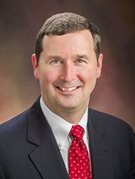

 (Left Image: Jack as Chief Resident at Boston Children’s, 1995)
(Left Image: Jack as Chief Resident at Boston Children’s, 1995) (POSNA Travelling Fellows - Europe, 2002)
(POSNA Travelling Fellows - Europe, 2002) (Right Image: The Flynn family, 2006)
(Right Image: The Flynn family, 2006)